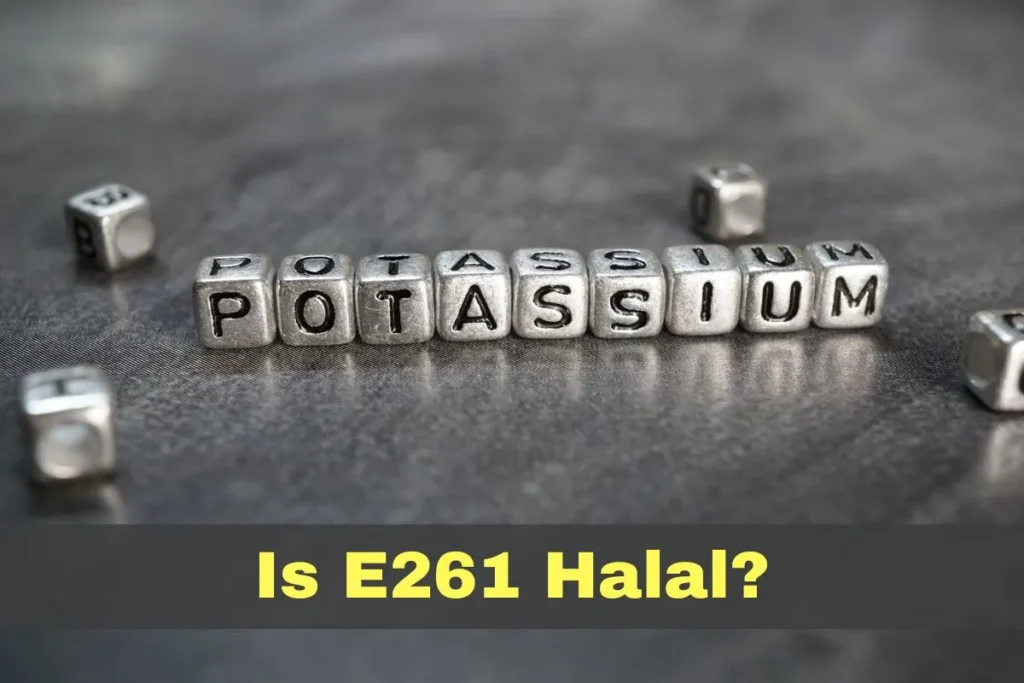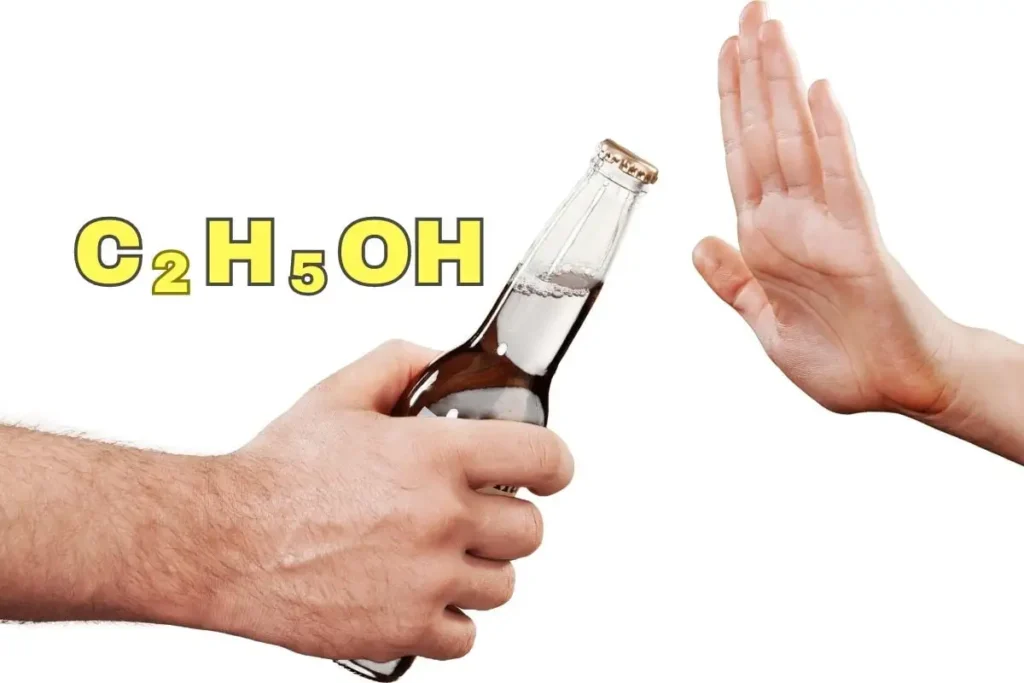Points clés à retenir
Hello, dear readers! Today, we’re diving deep into a topic that’s been on many minds: Is E261 Halal? Let’s embark on this enlightening journey together, shall we?
| 📌 E261, aussi connu sous le nom Potassium Acetate, is a food additive that’s used to preserve food and control its acidity. |
| 📌 It’s made through a process where acetic acid (like the acid in vinegar) meets potassium carbonate or potassium hydroxide, forming white crystals that dissolve in water. |
| 📌 The good news is that E261 is generally considered halal, meaning it’s permitted under Islamic dietary laws. It doesn’t come from forbidden ingredients. So, you can usually eat foods containing E261 without worry. |
What is E261?
E261, commonly known as Potassium Acetate, is a food additive used primarily as a preservative and acidity regulator in various food products. It’s a salt that forms when acetic acid reacts with potassium hydroxide.
Structure chimique
The chemical formula for Potassium Acetate is CH₃CO₂K. It’s a simple compound, but its role in the food industry is quite significant.
What Is E261 Made From?
E261 is synthesized by neutralizing acetic acid (found in vinegar) with potassium carbonate or potassium hydroxide. The result is a white crystalline substance that’s soluble in water.
Imagine taking acetic acid, the same stuff that gives vinegar its tangy kick, and introducing it to either potassium carbonate or potassium hydroxide. The dance between these compounds results in the birth of E261!
Now, you might be thinking, “Why these specific compounds?” Great question! Acetic acid is an acid (obviously!), and when it meets a base like potassium carbonate or potassium hydroxide, they neutralize each other.
This neutralization process forms our star compound, Potassium Acetate. And the outcome? A pristine white crystalline substance that loves to dissolve in water.
| Ingrédient | Role | Outcome |
|---|---|---|
| Acetic Acid | Provides the acidic component | Part of the resulting E261 |
| Potassium Carbonate OR | Acts as the base | Part of the resulting E261 |
| Potassium Hydroxide | ||
| E261 (Potassium Acetate) | Result of the neutralization process | White crystalline, water-soluble |
So, the next time you come across E261 in an ingredient list, you’ll know exactly what went into making it. It’s all about the perfect blend of chemistry and culinary art!
Les effets secondaires possibles
While Potassium Acetate is generally considered safe, excessive consumption can lead to certain side effects. These might include skin and eye irritation, and ingestion problems such as nausea or vomiting. Always remember, moderation is key!
Règlements et lignes directrices
Regulations and guidelines for potassium acetate in food are as follows:
- United States: The US Food and Drug Administration (FDA) has not established a use level for potassium acetate or potassium.
- Canada: Health Canada has proposed to enable the use of potassium acetate and potassium diacetate as preservatives in meat and poultry products. The maximum levels of use for potassium acetate and potassium diacetate are Good Manufacturing Practice (GMP) and 0.25% of the final product weight, respectively.
- FAO/WHO: Potassium acetate is acceptable in foods conforming to the commodity standards CS 273-1968 and CS 275-1973. Potassium acetate is included in Table 3 of the Codex General Standard for Food Additives (GSFA) and may be used in foods under the conditions of good manufacturing practices (GMP) as outlined in the Preamble of the Codex GSFA.
- European Union: Potassium acetate is included in Annex II and III to Regulation (EC) No 1333/2008 of the European Parliament and of the Council on food additives. The specifications for potassium diacetate should be included in Regulation (EU) No 231/2012.
Therefore, potassium acetate is regulated as a food additive in different countries and regions, and its use is subject to specific guidelines and regulations.
Is E261 Halal or Haram?
E261 or Potassium Acetate, is considered halal as it is not derived from any ingredients that are forbidden by Islamic law. You can safely consume products containing this ingredient, provided there are no health concerns or complaints.
En savoir plus:
Est E260 Halal ou Haram ?
Est E262 Halal ou Haram ?
Conclusion
In the journey to uncover the mysteries of E261, we’ve delved into the realm of Potassium Acetate, discovering its origins, its safe usage when consumed responsibly, and its acceptance under Islamic dietary laws as halal.
Whether it’s preserving meats, keeping canned vegetables fresh, or maintaining the texture of certain cheeses, E261 plays a crucial role in our food industry.
So, the next time you enjoy these culinary delights, you can appreciate the chemistry and care that goes into your favorite dishes. Remember, moderation is the key to savoring the flavors of E261 safely.
Now, with knowledge in hand, you can dine with confidence, knowing that your choices align with your values and dietary preferences. Bon appétit!
FAQ
What is the source of E261?
E261 is derived from the reaction of acetic acid with potassium carbonate or potassium hydroxide.
Is E261 safe for consumption?
Yes, when consumed within recommended limits, E261 is considered safe. However, excessive intake can lead to side effects.
What are some common food products that contain E261?
E261 is found in various food products, especially those that require preservation and acidity regulation.
Now, let’s get specific. Where exactly might you find E261? For starters, it’s commonly used in preserved meat products to extend their shelf life.
Love canned vegetables? E261 is often added to keep them tasting fresh and to prevent them from becoming too acidic or too alkaline. And let’s not forget about certain dairy products, like cheeses, where E261 helps in preventing spoilage.
Here’s a quick table to give you a clearer picture:
| Produit alimentaire | Reason for Using E261 |
|---|---|
| Preserved Meats | Extends shelf life and maintains freshness |
| Canned Vegetables | Regulates pH and preserves freshness |
| Certain Cheeses | Prevents spoilage and maintains texture |
| Pickled Foods | Balances acidity for that perfect tang |
What is the CAS number of E261?
The CAS number for Potassium Acetate (E261) is 127-08-2.
Is E261 banned in any country?
While E261 is approved for use in many countries, regulations can vary. It’s essential to check local guidelines before consumption.





